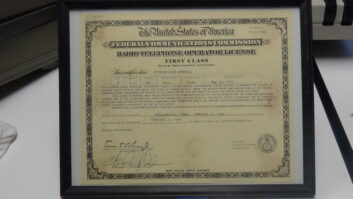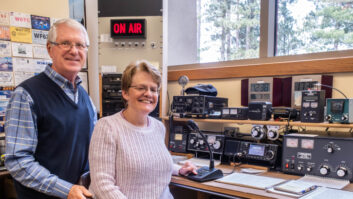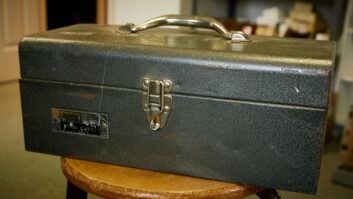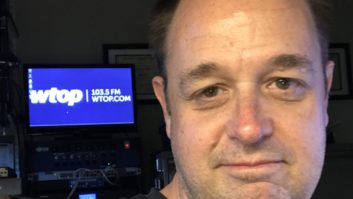Some people are larger than life. Think of Mae West, Ronald Reagan and Ted Baxter, the bombastic newsman from “The Mary Tyler Moore Show.”
Well, George Putnam, who until recently hosted CRN Digital Talk Radio’s syndicated “Talk Back,” dated Mae West, interviewed Ronald Reagan and was the inspiration for Ted Baxter. And to his listeners, Putnam was as big and legendary a character as any of them.
He died Sept. 12 at age 94.
Putnam started his career in radio in 1934 at WDGY(AM), Minneapolis, and after a few stops landed in 1951 in Los Angeles, where he crashed the gates of television as an anchor at KTTV, KTLA, KCOP and KHJ (now KCAL).
According to a bio from CRN Digital Talk Radio, Putnam at one time reportedly was the highest-rated and highest-paid TV news anchor in Los Angeles. Former President Richard M. Nixon said in the 1980s that Putnam had been “one of the most influential commentators of our times.”

Putnam celebrated a birthday in 2007 with CRN Digital Talk Radio’s Jill Garnseki, left, and Erin Farrell. More than 20 years ago, he returned to his radio roots with “Talk Back,” a local show that was picked up for syndication in 1997. He did the show until last May from a studio at his ranch in Chino, Calif. “Talk Back” is still heard in Boston, Pittsburgh, Philadelphia, Chicago and several stations in southern California, now hosted by Putnam’s producer, Chuck Wilder.
Shortly before his death, Putnam talked to Radio World about new media and whether he considered them a threat to terrestrial radio.
“It all depends on the broadcasters and their content,” he said. “I say to be yourself, let it all hang out! If they like it, great. If they don’t, let ’em kick your ass out!”
As is now apparent to even the most casual reader, Putnam was never shy about his opinions. Because he spent so many years on the air, we asked him if he had any “stupidest decisions I’ve ever seen in radio” stories. He did.
“A station used my show to get ratings, then sold the station,” he said. The new owners “flipped it to a foreign language news format, fired me and it failed!”
Twinkle
Putnam influenced a lot of people throughout his career, including a few that later worked with him.
“I used to watch him on TV as a kid,” said Mike Horn, president/CEO of CRN Digital Talk Radio, which also syndicates “The Robert Conrad Show” (he of “Wild, Wild West” TV fame), “The What’s Cookin’ Show” and many others. “He was an icon here in Los Angeles. George and I worked together for about 11 years.”
During his 57-year career in L.A., Putnam built a reputation as a showman.
“He was always on, even when you were having lunch with him,” Horn said. “He had a twinkle in his eye and that great voice. I admired his energy.”
But why did he never wear out his radio welcome, as so many other talents have done?
“It was his warmth and his connection with the audience,” said Horn. “You felt like you could have him over to coffee. A lot of guys have big voices, but George had a certain likability so people weren’t afraid to call him.”
In his final months Putnam had health problems, so his long-time producer/co-host/substitute host Wilder filled in on the air. (“Talk Back” is streamed at www.crni.net.)
“It was a privilege to work with him,” said Wilder. “It’s not that I was star-struck by him; it’s more like I respected his credentials.”
Before the show was picked up for national distribution, the issue of local vs. national topics wasn’t a problem. But later Wilder and Putnam addressed whether to broaden their focus.
“The situation with syndication is that some program director in another market will say, ‘Don’t talk about someone in Chino having a Christmas Tree sale,’ but I disagree,” Wilder said.
“Whatever is important in California is important to the rest of the nation. George believed that an interesting story would be interesting all over the U.S. Many programmers didn’t know who George Putnam was because he was primarily a local talk host up until the last 10 years. They saw his résumé but didn’t know how great he was.”
Old school
And Putnam’s résumé was pretty impressive. He and Lowell Thomas shared duties as the voices of Movietone News during World War II. He also served in the Army as well as in the Marine Corps. Too many awards and honors have been bestowed upon him to list here (more than 300), but they include Emmys and citations for his news coverage.
George Putnam bred 400 horses, one of which ran in the Kentucky Derby. His Hollywood friends included Jack Benny, Red Skelton, Martin & Lewis, George and Gracie Burns, all of whom he appeared with on TV. Doris Day called him on the air when he returned last July for his 94th birthday. CRN Digital Talk Radio claims that Putnam was the longest continuously-aired talk show host in radio, with more years of service than even Paul Harvey. His op-end column “One Reporter’s Opinion” put his views before yet more audiences via the Internet.
“George was a little dramatic, a little flamboyant,” said Wilder. “But it was those qualities that made him stand out. He could read the Wall Street Journal out loud and make it interesting, because he was really an actor at heart. A local Indian tribe gave him the nickname, ‘Chief Thunder Voice,’ and that fit. But I’ll tell you this, there are probably 1,000 producers across the country that would have loved to work with the man.”
Putnam was seen as some as a conservative. He told one interviewer he didn’t think of himself that way: “I detest labels. I’ve been called many things in my career: right-wing extremist, super-patriot, goose-stepping nationalist, jingoistic SOB. And those are some of the nice things! But those people have never bothered to determine my background: Farmer-Labor Party, Socialist Party, lifelong member of the NAACP, member of the Urban League. I went through the Depression, and my father was reduced to selling peanuts door-to-door.” He described himself as a lifelong, conservative Democrat.
After Putnam’s death, Mike Horn issued this statement: “George was an icon and true legend in the television and radio business. George was truly the last of an era. He was a character whose story-telling abilities could not be beat, a patriot whose love for America influenced everything he did, and a friend who brought insight and laughter to everyone.”
Our final thought comes from Putnam, who spoke with Radio World days before his death. We asked him what he got excited about at age 94.
“My next breath; and my crusade for the people and a better, stronger America.”












